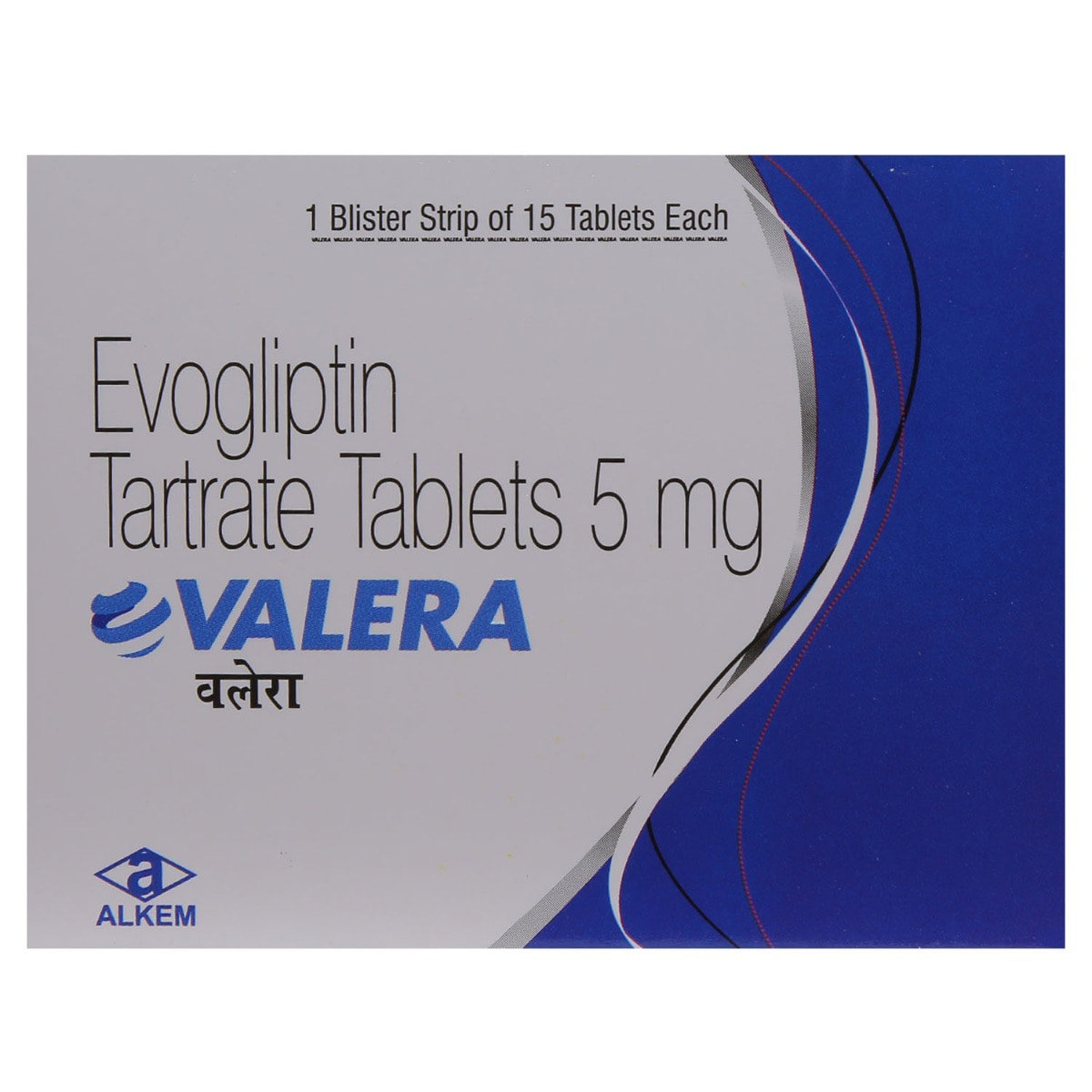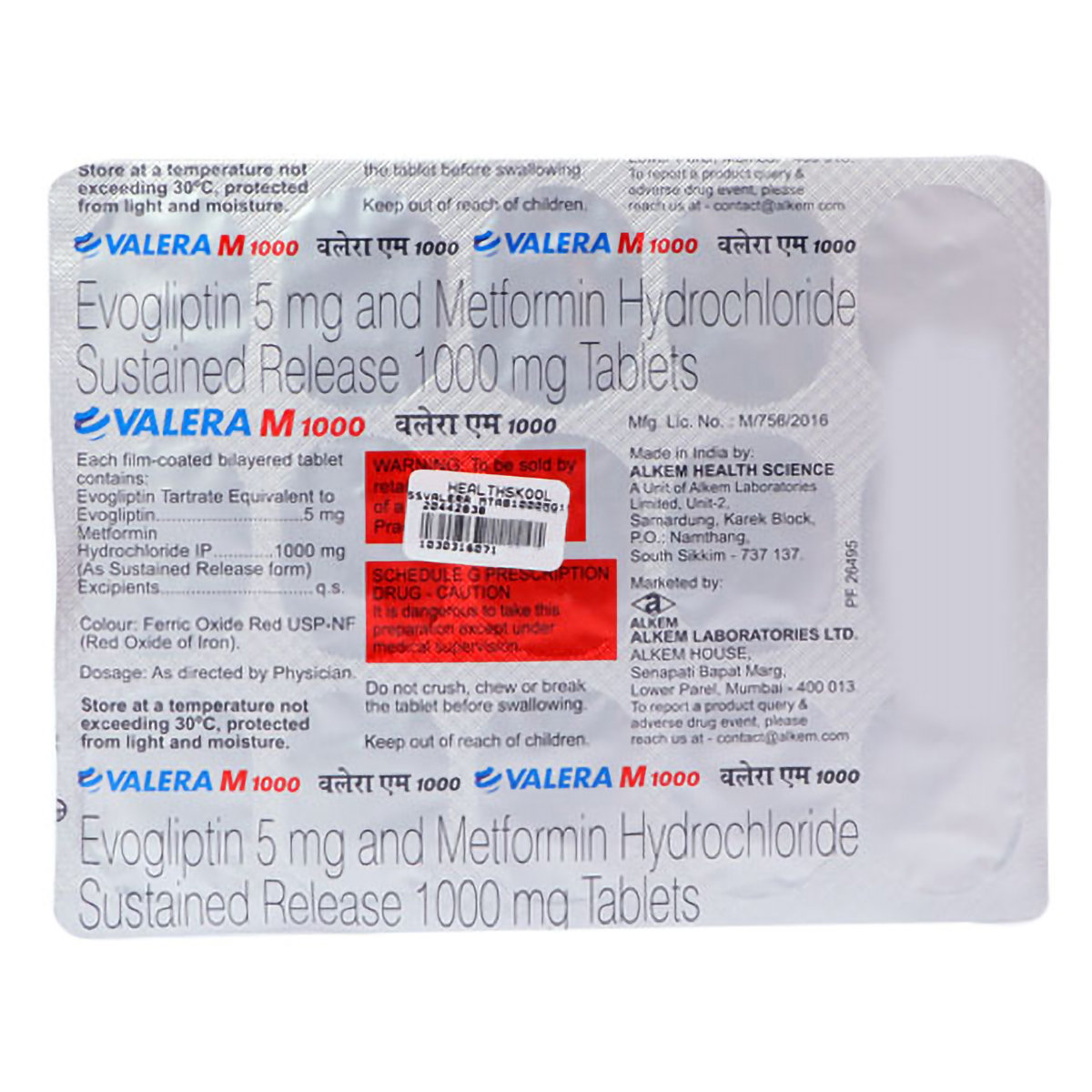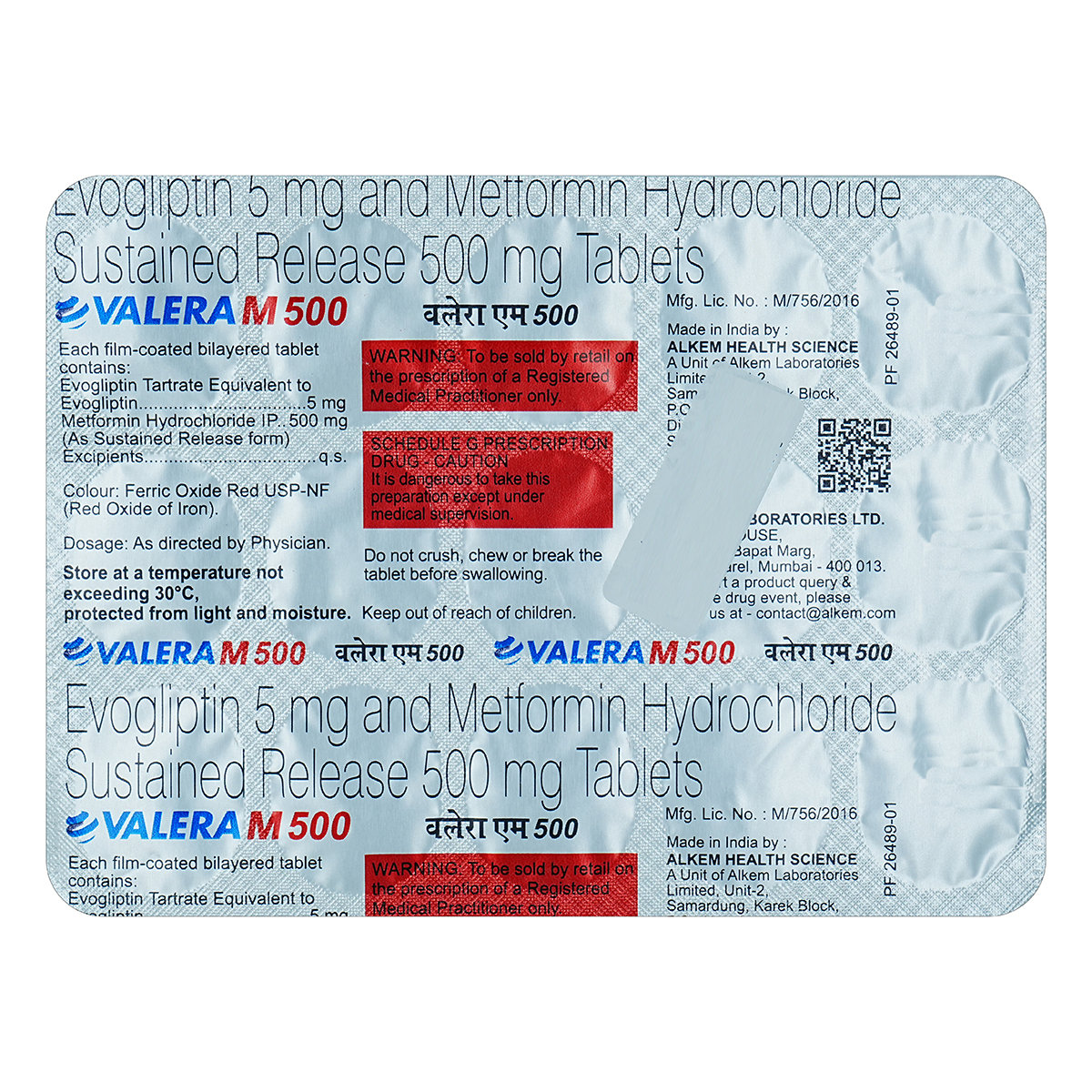Evogliptin
About Evogliptin
Evogliptin belongs to the group of anti-diabetic medicines called dipeptidyl peptidase-4 inhibitors used to treat type-2 diabetes mellitus adjunct to diet and exercise. Type-2 diabetes mellitus is also known as non-insulin-dependent diabetes or adult-onset diabetes. It is a medical condition in which blood glucose levels are above normal due to insulin deficiency, insulin resistance, or both.
Evogliptin contains ‘Evogliptin’, it promotes insulin secretion from the pancreas and regulates blood glucose levels post-meal by controlling glucagon secretion. Evogliptin exhibits hypoglycaemic effect by inhibiting dipeptidyl peptidase-4 activity. Thereby, Evogliptin helps treat diabetes.
In some cases, Evogliptin may cause common side effects such as indigestion, diarrhoea, nasopharyngitis (cold), gastritis, and joint pain. Most of these side effects do not require medical attention and will resolve gradually over time. However, you are advised to consult your doctor if the side effects persist or worsen.
Consult your doctor if you are pregnant or breastfeeding. Evogliptin is not recommended for children as safety and efficacy have not been established. It is unknown if alcohol interacts with Evogliptin, so please consult a doctor if you have any concerns. Inform your doctor about all the medicines you are taking and your health condition to rule out any unpleasant side effects/interactions.
Uses of Evogliptin
Medicinal Benefits
Evogliptin belongs to the group of anti-diabetic medicines called dipeptidyl peptidase-4 inhibitors used to treat type-2 diabetes mellitus adjunct to diet and exercise. Evogliptin promotes insulin secretion from the pancreas and regulates blood glucose levels post-meal by controlling glucagon secretion. Evogliptin exhibits a hypoglycaemic effect by inhibiting dipeptidyl peptidase-4 activity. Thereby, Evogliptin helps treat diabetes.
Directions for Use
- Evogliptin should be taken with or after food to enhance its effectiveness and reduce stomach discomfort.
- It is recommended to take Evogliptin once daily or as advised by your doctor.
- Swallow Evogliptin as a whole with a glass of water.
- Do not break, chew, or crush it.
Storage
Side Effects of Evogliptin
- Indigestion
- Diarrhoea
- Nasopharyngitis (cold)
- Gastritis
- Joint pain
Drug Warnings
Do not take Evogliptin if you are allergic to any of its contents; if you have severe ketosis, type-1 diabetes, diabetic pre-coma or coma. Inform your doctor if you have heart problems, diabetic ketoacidosis, acute pancreatitis, low blood sugar levels, kidney or liver problems. Consult your doctor if you are pregnant or breastfeeding. It is unknown if alcohol interacts with Evogliptin, so please consult a doctor if you have any concerns. Inform your doctor about all the medicines you are taking and your health condition to rule out any unpleasant side effects.
Drug Interactions
Drug-Drug Interactions: Evogliptin may interact with antibiotics (clarithromycin).
Drug-Food Interactions: No interactions found/established.
Drug-Disease Interactions: Inform your doctor if you have diabetic ketoacidosis, acute pancreatitis, or hypoglycaemia (low blood sugar levels).
Drug-Drug Interactions Checker List:
Safety Advice

Alcohol
cautionIt is unknown if alcohol interacts with Evogliptin, so please consult a doctor if you have any concerns.

Pregnancy
unsafeEvogliptin is not recommended for pregnant women. Please consult your doctor if you have any concerns regarding this.

Breast Feeding
unsafeEvogliptin is not recommended for breastfeeding mothers. Please consult your doctor if you have any concerns regarding this.

Driving
cautionIt is not known if Evogliptin affects your ability to drive. Drive or operate machinery only if you are alert.

Liver
cautionPlease consult your doctor if you have a liver impairment or any concerns regarding this.

Kidney
cautionEvogliptin should be used with caution in patients with renal impairment. Please consult your doctor if you have kidney impairment or any concerns regarding this.

Children
cautionEvogliptin is not recommended for children as safety and efficacy has not been established.
Habit Forming
Diet & Lifestyle Advise
Include foods rich in healthy carbohydrates and fibre, fruits, whole grains, and vegetables.
Try eating food at regular intervals. Do not skip meals. Also, try not to overeat.
Follow a healthy diet and walk for at least 45 minutes to complement treatment with Evogliptin.
Maintain a healthy weight by exercising regularly.
Rest properly, avoid stress by doing meditation or yoga.
Special Advise
Regularly monitor blood glucose levels while taking Evogliptin.
Try not to skip any doses and take Evogliptin for as long as your doctor has prescribed it for you.
Always carry a sugary food such as candy or fruit juice and consume them if you experience hypoglycaemia.
Patients Concern
Disease/Condition Glossary
Type-2 diabetes mellitus: It is also known as non-insulin-dependent diabetes. It is a chronic or lifelong disease that keeps the body from utilizing insulin properly. Diabetes is a medical condition in which blood glucose levels are above normal. People with type 2 diabetes either do not produce enough insulin, or the insulin produced cannot perform its function in the body (insulin resistance). Middle-aged or older individuals are most likely to suffer from type 2 diabetes; hence, it is also known as adult-onset diabetes. Type 2 diabetes symptoms include lack of energy, tiredness, frequent urination, excess thirst, dry mouth, blurry vision, constant hunger, weight loss, and itchy skin.
FAQs
Evogliptin is used to treat type-2 diabetes mellitus adjunct to diet and exercise.
Evogliptin promotes insulin secretion from the pancreas and regulates blood glucose levels post-meal by controlling glucagon secretion. Thereby, Evogliptin helps treat diabates.
Do not stop taking Evogliptin without consulting your doctor, as it may cause an increase in blood glucose levels. Continue taking Evogliptin for as long as your doctor has prescribed it to you. Do not be reluctant to speak with your doctor if you experience any difficulty while taking Evogliptin.
Hypoglycaemia/low blood sugar levels could be the side effect of Evogliptin. Hypoglycaemia generally occurs when Evogliptin is taken along with other antidiabetic medicines, without food or with alcohol. Consume sugary food such as candy or fruit juice if you experience hypoglycaemic symptoms such as dizziness, cold sweats, anxiety, or tremor. Regularly monitor blood glucose levels while taking Evogliptin.
If you miss a dose, try to take it as soon as you remember. However, if it is almost time for the scheduled dose, skip the missed dose and take the scheduled dose instead. Avoid taking the double dose as it might cause unpleasant side effects or overdose.
Low fibre, high fat diet, sugary diet, obesity, smoking, stress, lack of exercise, age, genetic factors, and certain medical conditions are the common causes of diabetes.
Take your medication as directed by your doctor for the recommended duration. Maintaining stable blood sugar levels is crucial to prevent complications. Don't stop taking the medication without consulting your doctor, as this may cause blood sugar levels to rise and lead to other issues. Your doctor will monitor your progress and adjust treatment based on your response and any side effects.
Yes, you should continue to eat a nutritious diet and exercise while using Evogliptin to improve and speed up your health recovery. Specifically, Evogliptin is used together with diet and exercise to treat type-2 diabetes mellitus.
In general, you should not consume any expired medication. If you mistakenly took an expired dose of Evogliptin. Expired drugs may lose their effectiveness, although they are usually harmless. However, you should be aware of any negative symptoms. If you suffer any side effects or feel ill, consult your doctor for advice. They can offer individual advice depending on your specific health requirements.
It's important not to share your medication with others, even if they have a similar condition. Each person's health needs are unique, and your mother should consult a doctor to get a prescription that describes her situation. Sharing medication can lead to unintended side effects or complications.
Common side effects of Evogliptin may include diarrhoea, Indigestion, Joint pain, Nasopharyngitis (cold), and Gastritis. Most of these side effects do not require medical attention and will resolve gradually over time. However, you are advised to talk to your doctor if you experience these side effects persistently.
Evogliptin did not affect the body weight or blood lipid profile. Individual reactions may vary, so keep monitoring any weight changes while using this drug. If you are concerned about weight gain, consult your doctor. They can provide you with personalized advice and change your treatment plan as needed.
Evogliptin should be used with caution if you have kidney issues. It may cause the medication to build up in your body, resulting in serious side effects. If you have any already existing kidney issues, you should consult your doctor before talking Evogliptin. Based on your clinical situation, your doctor may propose appropriate dose modifications.
Yes, Evogliptin can cause low blood sugar levels, called hypoglycemia. This is more likely to happen if you take Evogliptin with other antidiabetic drugs, skip a meal, or drink alcohol. To avoid hypoglycemia, monitor your blood sugar levels frequently and eat regular meals. If you have any concerns or symptoms of hypoglycemia, speak with your doctor for personalized advice and treatment.
Be aware of potential risks: severe allergic reactions, pancreatitis, increased hypoglycemia risk, and kidney problems. Consult your doctor during pregnancy/breastfeeding and consider dose adjustments for liver/kidney impairment. Evogliptin interacts with other diabetes medications, beta-blockers, and certain antibiotics. Consult your doctor or pharmacist for personalized guidance.
Evogliptin is generally safe for long-term use in managing type 2 diabetes, effectively reducing HbA1c levels and improving glycemic control. Follow your doctor's instructions, Monitor for potential side effects, and discuss any concerns with your doctor to ensure safe and effective treatment.
Take Evogliptin only as prescribed by the physician. Do not exceed the recommended dose, as it might cause an overdose. If you suspect you have taken an overdose, seek immediate medical attention. The doctor will perform symptomatic and supportive therapy depending upon the patient's condition.
Evogliptin is an antidiabetic medication used to manage type 2 diabetes. Its primary purpose is to help control high blood sugar levels. By regulating blood sugar, Evogliptin helps to prevent complications associated with diabetes, such as nerve damage, kidney damage, and cardiovascular issues.
Evogliptin should be taken with or after food to enhance its effectiveness and minimize any potential gastrointestinal side effects. Swallow the tablet whole with a glass of water without breaking, chewing, or crushing it.
Evogliptin is not recommended for use during pregnancy or breastfeeding. The safety data for Evogliptin in these situations have not been clinically established. If you are pregnant, planning to become pregnant, or breastfeeding, it's important to consult your doctor for alternative treatment options that are safer for you and your baby
You can take other medicines while on Evogliptin if advised by the doctor. It is essential to inform your doctor about all the medications you are currently taking, including over-the-counter drugs and supplements. Some medications may interact with Evogliptin and increase the risk of side effects, such as hypoglycemia (low blood sugar levels). Your doctor can help you manage these potential interactions and adjust your treatment plan.
Evogliptin is not suggested for children because the safety and efficacy have not been established. Please consult your paediatrician and describe your child's conditions; your doctor will guide and prescribe the best option for your child.
Evogliptin might interact with diabetic ketoacidosis, severe pancreatitis, or hypoglycemia (low blood sugar). To avoid potential interactions, inform your doctor about any pre-existing conditions or medications you are currently taking.




